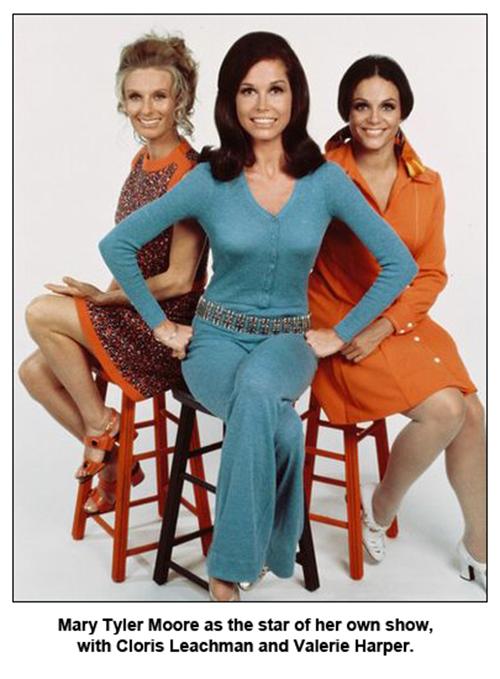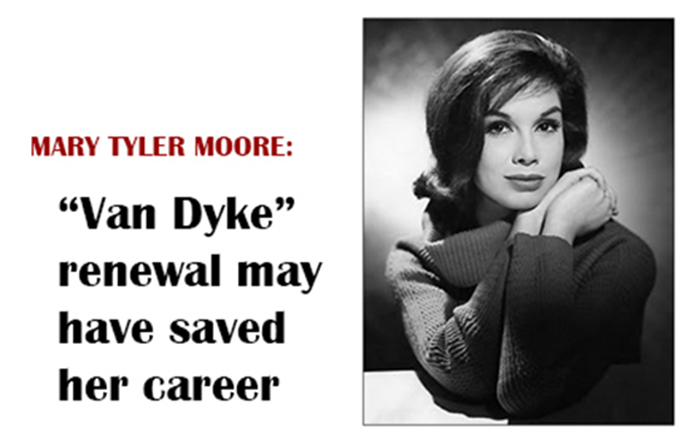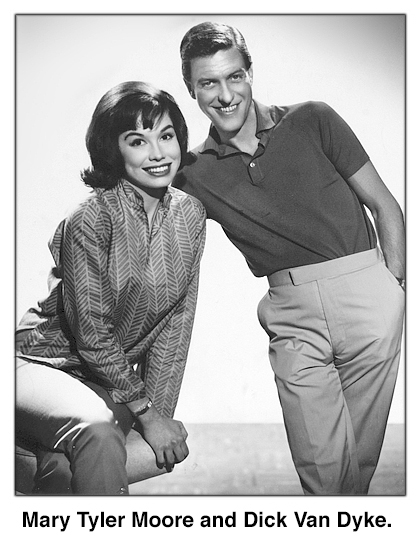Akron Beacon Journal, September 30, 1962
By JACK MAJOR
Mary Tyler Moore describes herself as one of the rarest of creatures – “a satisfied actress.”
Moore, who plays Dick Van Dyke’s wife each Wednesday on CBS, claims she couldn’t be happier doing anything else.
“Some day I’d like to be a big star,” she said, “but now I’m satisfied to be working with such wonderful people on a television series.”
Those wonderful people are Van Dyke, Rose Marie, Morie Amsterdam, Richard Deacon and Larry Mathews, her co-stars, and Carl Reiner, Danny Thomas, Sheldon Leonard and John Rich, the writer, owner, producer and director of the show.
Moore, 24, did regular work on one other TV series. She was Sam, the telephone operator, on “Richard Diamond,” but only her shapely knees and sultry voice were exposed.
Speaking on the telephone from her California home last week, Moore sounded less like sultry Sam and more like the young housewife who might be living next door. Her housewife voice, the one she normally uses, is not sultry at all. And her real husband is not Dick Van Dyke, but an NBC vice president named Grant Tinker. Like the housewife she plays on TV, Moore has a son named Ritchie, a six-year-old from a previous marriage to Richard Meeker, a CBS sales representative.
“I had nothing to do with the choice of names,” she said, adding that she often reads scripts aloud when she’s at home, occasionally causing her son to come running, asking, “Mommy, why did you call me?”
Her phone call was one of several she made during a week-long break from filming. “The Dick Van Dyke Show,” despite good reviews, was lucky to survive its first season. Another highly regard comedy, “The Bob Newhart Show,”** was not so lucky.
[**NOTE: This is not to be confused with Newhart’s classic sitcom with Suzanne Pleshette that went on the air 11 years later.]
“Frankly, our show didn’t do well at all with the ratings last season,” said Moore. “We feel many people who watched us during the summer were watching us for the first time. We hope to pull some of those people away from Perry Como this fall.”
“The Dick Van Dyke Show” airs at 9:30 p.m., the halfway point for their two competing programs, Como’s variety show on NBC and ABC’s “Hawaiian Eye.” Van Dyke’ show suffered its first season because its lead-in was the low-rated “Checkmate.” This year its lead-in is “The Beverly Hillbillies,” one of the most highly touted new programs.
“If ‘Hillbillies’ does as well as expected, we should do a lot better than last year. Our show was renewed only through the generosity of our sponsors, Proctor and Gamble, who had faith in us.
“We won’t be doing anything different this season. We felt we had a good show last year.”
The Van Dyke show rehearses five days a week and films on the sixth day.
“We work in front of an audience and it takes about two hours to get 30 minutes of film.”
This helps the show avoid the phony laugh track, but it creates other problems in the same area.
“If I blow a line,” Moore explained, “the director will explain it to the audience. Sometimes I’ll fluff two or three times. Then, when I get it correct, the audience will applaud. The home viewers wouldn’t know what the applause is all about, so the sound track has to be altered.
“We did a show where Dick makes a difficult pool shot. It was set up for him four times and he missed each one. Finally, when he made the shot, the audience went wild. That scene wasn’t supposed to evoke so much laughter, so, again, the sound track was altered.
“Besides, it has been proven the home audience doesn’t laugh as loud as the live audience, so we subtract laughter rather than add it.”
Moore said she thinks the show and its on-stage filming have helped her immeasurably as an actress. She feels she’ll be ready when the opportunity presents itself to star in an important feature film.
“Right now a company would probably lose money if they starred me in a picture. I’m just not that well known.
“Another thing, it’s very difficult to get a part in movies in Hollywood. The companies are filming so many of their pictures in other locations.”
Van Dyke had a break this summer when he was given the lead in “Bye, Bye Birdie,” one of the few films done on a California lot. Van Dyke also starred in the Broadway production of the musical.
Moore has done just one movie – “X-15” – and that was made before the Van Dyke show went on the air.
“My agents are being very kind to me,” she said. “If I am getting any other offers, they’re not telling me and I’m glad. I’d hate to think I was missing anything.” |



